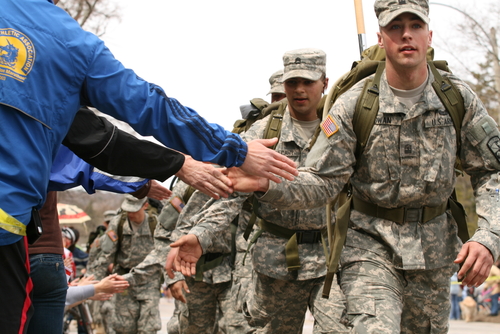When bombs exploded near the finish line of the Boston Marathon on Monday, nobody was prepared for the devastation that ensued. At the end of the day, the blast had taken the lives of three people, including an 8-year-old child. Aside from the death toll, a staggering 176 people were injured, and many people had to undergo limb amputations as a result of their injuries. What was supposed to be a proud day of celebration for the city of Boston quickly dissolved into a nightmare that Boston residents will surely never forget. Many people can’t help but wonder, “Could this tragedy have been prevented?”
Any large scale outdoor event is bound to present security challenges for the personnel in charge of keeping people safe. In an inherently chaotic atmosphere, where thousands of people are outdoors, stretched out over 26.2 miles, and almost everyone is wearing a backpack, can we truly make sure that nothing goes wrong?
If you attend a marathon tomorrow will you be completely secure? The unfortunate reality is — probably not.
Nothing Is Guaranteed
A city or organization can devote countless hours and spend all the money in the world on security efforts, but you can never completely ensure the safety of everyone. This is doubly true for large-scale outdoor events. There are simply too many variables, and too much ground to cover to make any guarantees about safety efforts. In a recent news article, Former Homeland Security Secretary Tom Ridge said, “They probably had undercover police, they probably had observers on the roof. I suspect they had cameras, they had people roaming the area, but again—open public venue, 500,000 people, you can’t create a fail safe environment.”
The Disaster Potential of Outdoor Events
In the excitement of preparing for an outdoor event, most people are thinking of ways to maximize their fun as opposed to focusing on their safety. Concerts, festivals, and of course, marathons all come with their own unique security challenges as the safety measures that are in place, can only do so much.
Regarding the latest tragedy in Boston, Lou Marciani, director of the National Center for Spectator Sports Safety and Security at the University of Southern Mississippi in Hattiesburg, Miss. said, “There’s no perimeter control, there’s no access control, there’s nothing.” It isn’t until we are brutally reminded of how vulnerable we really are in a crowd setting that we begin to consider the importance of security and safety measures.
It Doesn’t Take Much
Many questions about the Boston attack have yet to be answered, but many initial reports have stated that the FBI does not believe this to be the work of an organized group, or an international terrorist organization. The materials used to make the bombs were easily accessible, and wouldn’t have been very difficult to put together. One official described the bombs as, “Crude, unsophisticated, but still deadly.” That is quite possibly the scariest sentence I’ve ever heard. The takeaway message from this statement is, it doesn’t take much to hurt a lot of people very quickly.
Anyone Could Have Done It
At first, White House press was reluctant to use the term “terror attack” to describe the Boston Marathon bombing. It is now widely believe that this was a domestic attack, that was perhaps perpetrated by a single individual. One of the most disturbing facts surrounding this incident is that the suspect remains at large. Right now our best hope lies in security official’s memories of “shady characters.” Meanwhile, authorities say they are trying to locate as many pieces of the pipe or backpack as possible, in order to trace those items back to when and where they were purchased, and also look for any recent chemical explosives that were sold in the Boston area.
When Will it Stop?
We are all undoubtedly thinking it, “When will all these violent acts finally stop?” It seems like lately the U.S. has been taken over by school shootings, mass murders, and now bombs going off at marathons? Horrific crimes are being committed in almost every state across the country, and there is seemingly little we can do to stop it. This feeling of powerlessness this evokes is almost devastating.
How to Recover
It’s certainly easy to feel hopeless and lose faith when senseless, horrible things just keep happening to innocent people. When seeking spiritual comfort, many of us turn to lessons learned from our childhoods. Many people on Facebook are finding wisdom in the words of none other than Mr. Rogers who famously said, “Look for the helpers. You’ll always find people helping.” The one comforting truth to emerge out of this tragedy is that there was certainly no shortage of helpers. First responders ran toward those in need, residents of Boston opened their doors to people who needed a place to stay, and local restaurants would only charge people who could afford to pay. Some sources even reported that more blood got donated that day than the hospitals even needed.
Despite the abysmal implications of violent tragedies like the Boston Marathon bombing, or the Sandy Hook Elementary school shooting, at least we can take comfort in the fact that the healers will always outnumber the killers in this world. In the end, the healers win. Always. When in doubt, we can always look for the helpers. They will be there when we need them.
Image Credits: John Kropewnicki / Shutterstock.com
Marcio Jose Bastos Silva / Shutterstock.com
Featured images:
- License: Royalty Free or iStock source: http://www.shutterstock.com/dl3.mhtml?id=29036044
- License: Royalty Free or iStock source: http://www.shutterstock.com/dl3.mhtml?id=64813513
- License: Royalty Free or iStock source: http://www.shutterstock.com/dl3.mhtml?id=135269900
Jessica Ruane is a writer for Instant Checkmate, a public record search service that provides people with crime statistics for all fifty states.

Leave a Reply